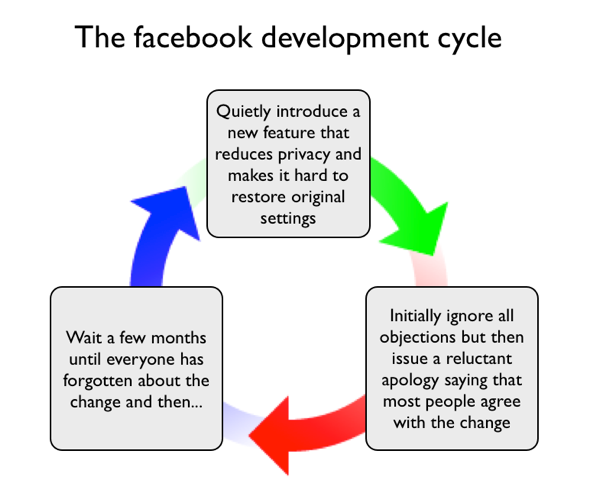Why I deleted my Facebook account
Reposted from my older blog that is about to disappear. Originally posted May, 2010.

Once upon a time I was a happy facebook user. But that was before the dark times, before the Empire. The first wave of facebook annoyance came with the arrival of applications. Leaving aside the annoying applications where a friend would invite you (and everyone that they know) to be a zombie or a pirate, the arrival of applications seemed to trigger a big switch in how people fundamentally used facebook. In the ‘post-application’ era, people started writing less about themselves and instead resorted to revealing their personality via applications such as ‘What type of fruit are you?’ or quizzes such as ‘Keith named 4 out of the 26 most popular sexually-transmitted diseases, how many can you name?’.
This was a change that I sad to see. In the ‘good old days’, people spent more time adding information to their profile. I could actually learn something about someone’s interests. Now however, people seem to rarely write anything, and the ‘info’ section on people’s profile pages is often a barren expanse of nothingness. There is still plenty of ‘face’ in facebook, but much less ‘book’. Even status updates are often auto-generated via plug-ins from other applications.
The next big set of problems with facebook came with the succession of poorly implemented design & policy changes. I’m not opposed to change but I think that even facebook will admit to having rushed through changes without properly explaining in advance what was going to happen. This seems to a recurring feature and one might depict the facebook development cycle like so:
If you are a recent convert to facebook then you may have forgotten about their first big PR issue over their Beacon technology which tracked your visits to sites outside of facebook. Like many of facebook’s missteps, they had to apologize and backtrack a little bit. It didn’t take long before Zuckerberg et al. created more controversy by silently changing the terms of service to allow them to keep any content you had created (even if you deleted your account). The backlash was swift, as was facebook’s move to revert to the prior terms of service.
Hopefully, many of you are aware of some of the latest problems that have arisen from facebook’s changes which are an attempt to let them dominate the entire galaxy be the central hub of all social interaction on the web. On Wednesday April 21st 2010, Mark Zuckerberg introduced facebook’s new Open Graph Protocol. This software makes the outcry over the Beacon technology look like a storm in a teacup. If I visit a site such as Fandango or the New York Times and I haven’t logged out of facebook, then facebook can track my browsing of those sites. In a way, this is not any different to what other web sites do, but the big issue here is transparency. How exactly are facebook and their partner sites using this huge amount of information? Do people realize the consequences of clicking the new facebook ‘like’ buttons that are beginning to adorn web pages everywhere?
Of course, if you understand the privacy policy and privacy settings of facebook then maybe this isn’t an issue. Just change your settings to whatever they were before facebook quietly changed them behind your back. The problem is that no-one really understands facebook’s privacy policy anymore. It has grown in size by nearly 600% since 2005 and now contains more words than the US constitution. That factoid is part of an excellent New York Times article which also points out that there are now 170 different options within the privacy settings. If you want to see how facebook has slowly eroded your privacy, then this page has a fantastic graphic on the evolution of privacy on facebook.
What annoyed me more than the new Open Graph Protocol is the change to my profile page. I had written a lot of text in all of the categories so that my friends could get some insights into my personality. The recent changes to facebook now require that this information must be linked to something called Community Pages. It is not enough to say that you work/study at Institute X or like Film Y. Instead, you must now link to a page for Institute X so that everyone can see that you are a member. This may well be a good idea, but I would have preferred a way of opting out of this.
There are so many changes that facebook have introduced in the last few weeks, it is a little overwhelming, but this article does a great job at going through them all and explaining the potential risks. All of these changes had made me consider whether I wanted to stay a part of facebook, but in the end it was reading this article on 10 reasons to delete your facebook account, that persuaded me to commit facebook suicide.
I am now cut off from facebook, and am therefore no longer one of its 400 million users. Maybe I will return, but I don’t think so. I feel that I have much better social interactions with people via my twitter account than I ever did with facebook. Indeed, there are many twitterers who I have never met in the real world, but whom I now consider to be more of a friend than many of the ‘friends’ that I had on facebook. Farewell facebook, it was fun while it lasted.
Update (added 13th May, 2010)
Of course I should have also pointed out that facebook doesn’t make it easy to leave. It’s a bit like trying to leave the clutches of a cult. Here’s a good piece about what happens when you (try to) deactivate your facebook account.